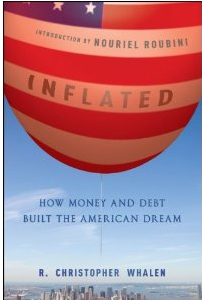 Chris Whalen is a pal of mine, and the author of Inflated: How Money and Debt Built the American Dream.
Chris Whalen is a pal of mine, and the author of Inflated: How Money and Debt Built the American Dream.
The book is developing a cult following amongst the Gold and anti-Fed cognescenti, the “inflationati,” and others.
Whalen’s background as a former NY Fed analyst and Bear Stearns banker puts him in a good position to look at the history of Inflation and the inherent growth at any cost bias bult into the American system.
The first chapter of the book is after the jump, and a few reviews are below. Enjoy . . .
~~~
Lawrence McDonald:
I first noticed the brains and talent in R. Christopher Whalen in 2007. I was a trader at Lehman and every time I saw Chris on CNBC I was blown away by his straight forward common sense approach to the inner workings of the world of modern finance. Chris called many ills of the financial crisis over a year before they happened. He’s made me a lot of money on more than one occasion. His book is much like his personality and intellect. He traces the deep roots of our financial system soiled years ago and brings them right into the 21st century. The book is a MUST read for anyone in finance or someone who wants to learn how we got here. I really like the way the book ties together a behind the scenes look in Washington and Wall St. The book should be required reading for every Federal Reserve board governor as well, lets learn from history instead of repeating it. Buy “Inflated” it’s a great read.
-Lawrence G. McDonald, New York Times Best Selling Author of “A Colossal Failure of Common Sense – The Inside Story of the Collapse of Lehman Brothers”
“Mr. Whalen, a consultant and former investment banker, marches zealously back in time to try to understand the long-term viability of the American economy in the wake of the 2008 financial crisis.
The author sees a conflict at the heart of Americans’ attitudes toward money and debt. We tend to view ourselves “as reasonably prudent and sober people,” he writes, while “the choices we make at the ballot box seem to be at odds with that self-image.”
“As a nation,” he says, “we seem to feel entitled to a national agenda and standard of living that is beyond our current income.”
To finance these expectations, we have continued to borrow extensively from the future — think subprime mortgages, household credit card balances, the federal debt, the trade deficit and more — with turbulent and, at times, nearly disastrous results.
With that as his starting point, Mr. Whalen sets out on a high-speed chase through specific moments in the nation’s economic and political history: the longstanding debate about a national bank in the late 18th and early 19th centuries; the issuance of paper money to finance the Union effort during the Civil War; the panic of 1893 and resulting depression; the government debt issued to finance both world wars; and the stagflation and the changing world order that began in the 1970s.
In each of these instances, Mr. Whalen bemoans Americans’ reliance on paper money and debt financing — a reliance, he contends, that is often fostered to expand political, business and financial leaders’ power and wealth.
The book is lively and opinionated throughout. In the first half, which runs roughly up to World War I, the author recounts the long-simmering debate, initiated by Alexander Hamilton and Thomas Jefferson, about the benefits and costs of consolidated financial power. He also criticizes Abraham Lincoln for “taking the United States down the road to political control over the nature of money via the Legal Tender Act of 1862,” which authorized the federal government to pay its bills in paper money not backed by an equal amount of gold or silver.
And his descriptions of the enormous — and, at times, audacious — power of J. P. Morgan and others in the Gilded Age call to mind bankers in some of our largest financial institutions today.”
Chapter 1 after the jump . . .


What's been said:
Discussions found on the web: